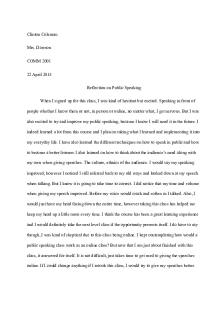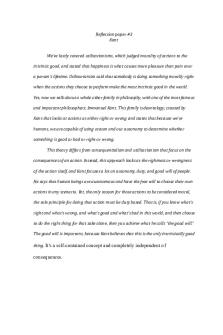Loss for Words Text Response Reflection Paper PDF

| Title | Loss for Words Text Response Reflection Paper |
|---|---|
| Author | Jeremy Nunez |
| Course | Deaf Culture And Heritage |
| Institution | SUNY New Paltz |
| Pages | 4 |
| File Size | 111.3 KB |
| File Type | |
| Total Downloads | 58 |
| Total Views | 141 |
Summary
As you read through the book Loss for Words by Lou Ann Walker reflect up on the authors experience growing up as a CODA( Hearing Child of Deaf Parents). Include your reaction to the book and reflect upon how it might feel if you were a CODA. ...
Description
Nunez 1
Jeremy Nunez
Professor Swenson
Deaf culture and Heritage
March 17, 2016
A Loss for Words
Imagine your parents being hard of hearing and them not having the ability on conversing with you, what might you believe? Starting with tossing fits alone same time her guardians were in another room, Lou Ann might have been constantly certain her guardians were listening to her when she was a kid. She would scream for help in another room and receive no answer; she also slammed books on the floor to see if she would get in trouble, but still no answer. When she didn’t receive a negative or positive response he realized her parents were actually deaf.
Doris Jean was raised at the Indiana State School for the Deaf after becoming deaf of spinal meningitis during infancy. Her parents had never met a deaf person before and the thought of raising a deaf child on their own was beyond their imagination. Sending Doris Jean away was an option they were willing to take, including the fact that many deaf children were sent to deaf institutions because many parents did not know how to communicate with their children and places like this is somewhere they felt comfortable at being. While being at the institution Doris Jean’s parents did not visit as often because the school was far from home. When she would go home for vacation and weekends her and her family would have to get reacquainted. She missed out on a lot her family did, especially the many animals they owned, she could be considered left
Nunez 2
out in a lot her family did, but she knew there was a reason. She was able to express and communicate more through sign language, something her family was not fluent in doing. After fourteen years at the Indiana State School for the Deaf Doris Jean graduated and moved into an Indianapolis apartment with another deaf friend. Their apartment was not deaf friendly they did not have flashing lights, open doors, or a doorbell.
Gale Walker became deaf three months after a severe fever; he has an older brother who was deaf at birth. Gale grew up on a farm and was able to be helpful and active with his family. He attended Huntington Street public school in Montepelier but in third grade he his family sent him to the Indiana State School for the Deaf. There he learned how to operate a linotype machine, which is used to print newspapers and was able to find a job after graduation. Gale was able to meet Jean Doris when she went to open the door for her roommate’s temporary stand in.
Doris and Gale were left alone and they connected instantly. They loved to be free away from their parents and school, they went out on dates, picnics, and talked all day. Soon enough they had their first hearing child Lou Ann. Lou Ann’s growing up years were complicated enough going through what a regular teenage girl goes through. But, being a child of deaf adults (C.O.D.A) she had to go through both these responsibilities without hesitation. She writes letters, makes phone calls, orders for them at restaurants, and talks to people at the bank for them, she was responsible for dealing with the outside world for them. Lou Ann’s parents did not like to ask her to do things, but she was a necessity. She felt a lot of pressure growing up and trying to be an ideal child for her parents. The adults in her life (except her parents) such as her grandparents pressured her to be a “good” girl. Lou Ann knew that she had a lot in her plate due to the fact that her parents sort of needed her more than she
Nunez 3
needed them. She did the things that they were unable to do because of their deafness. Like for example, making and answering important calls. Basically anything that had to do with communication through speak. Going back to her grandmother, there seems to be a lot of guilt happening throughout the book between them. Lou Ann did not play so much the role of a teenager in her family, more of the adult. She had to make a sacrifice and grow up faster than she was supposed to.
When Lou Ann went to college, at first she was afraid of not being accepted by the people in Harvard. Harvard is very known to be a difficult school especially if you did not have the resources like for example money. The reason behind Lou Ann going to Harvard was to get away from home, not because of her parents but to break away from all that she had to do throughout her years for her parents. They are not the one to blame, it was just the responsibilities she had. When Lou Ann graduated college, she eventually settled in New York. She worked for a magazine, but afterwards she became an interpreter as a side job. She became an interpreter because she needed more money, but then it just became an obsession. She has witness more on behalf of the Deaf community and the injustice they experience on their daily life. Lou Ann realized that she needed to stop feeling so responsible for everyone else. She started to speak out more. Eventually, Lou Ann reached out to her sisters about how it was like growing up in their family. She started to reach out to more people and ultimately she learned how to say no, and began to write about her experience
After losing her Grandfather, Lou Ann realized many things. Lou Ann mentioned how her mother just lost her father. “No relationship between parent and child is simple. And no matter how eloquent we are, grief cannot be translated into words.” This quote to me was very
Nunez 4
important when it came to Lou Ann perspective on her parents. Even though it was her mother who lost her father. Lou Ann loved her parents very much, and in Jen’s wedding she realized much more she noticed the love her parents had for each other. When she looked at them she saw the shy young couple in the Great Smoky Mountains thirty years earlier. She knew how much disappointments and frustration they had dealt with throughout the years, yet she still saw love. She would see other marriages that did not last and they seemed like a perfect marriage, but in reality those marriages would crumble and just give up, but she never saw that within her parents. She was strength regardless of all the flaws they probably thought they had because of them being deaf.
In New York she felt in love. She wanted to have a similar strong love that her parents had. For Lou Ann she finally emerged from being horrible, dark secret to being an unusual family history. She decided to make a positive change in her life, and that is what she did. The change was working on her favor. She saw more than just her deaf parents, she saw how much life they had with each other they were able to concur a lot without ever giving up or making life seem worthless, instead they used their love for good, and Lou Ann was proud of that and wanted to do the same with her love and her life in general. “Dad twirled Mom around and held her as they dipped. And then he looked up at me and winked.” So much joy, regardless of the storm that family had to go through. It’s beautiful to see a family being strong and staying together regardless of the bad they went through....
Similar Free PDFs

Loss For Words Paper - Grade: A
- 4 Pages

Reflection paper for pino
- 2 Pages

TTAYN Text Response
- 2 Pages

Response Paper
- 3 Pages

Text Response SAC Summary
- 12 Pages

Response Paper
- 3 Pages

Reflection Paper
- 2 Pages

Reflection Paper
- 4 Pages

Reflection Paper
- 2 Pages

Reflection paper
- 3 Pages

The Lieutenant Text Response 2
- 3 Pages

Poem Setting Response Paper
- 2 Pages
Popular Institutions
- Tinajero National High School - Annex
- Politeknik Caltex Riau
- Yokohama City University
- SGT University
- University of Al-Qadisiyah
- Divine Word College of Vigan
- Techniek College Rotterdam
- Universidade de Santiago
- Universiti Teknologi MARA Cawangan Johor Kampus Pasir Gudang
- Poltekkes Kemenkes Yogyakarta
- Baguio City National High School
- Colegio san marcos
- preparatoria uno
- Centro de Bachillerato Tecnológico Industrial y de Servicios No. 107
- Dalian Maritime University
- Quang Trung Secondary School
- Colegio Tecnológico en Informática
- Corporación Regional de Educación Superior
- Grupo CEDVA
- Dar Al Uloom University
- Centro de Estudios Preuniversitarios de la Universidad Nacional de Ingeniería
- 上智大学
- Aakash International School, Nuna Majara
- San Felipe Neri Catholic School
- Kang Chiao International School - New Taipei City
- Misamis Occidental National High School
- Institución Educativa Escuela Normal Juan Ladrilleros
- Kolehiyo ng Pantukan
- Batanes State College
- Instituto Continental
- Sekolah Menengah Kejuruan Kesehatan Kaltara (Tarakan)
- Colegio de La Inmaculada Concepcion - Cebu



